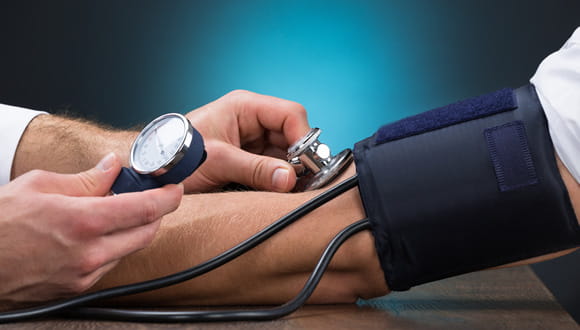When was the last time your blood pressure was checked?
It's important to keep tabs on your blood pressure numbers since having high blood pressure increases your risk for heart disease and stroke.
“High blood pressure is sometimes called a ‘silent killer’ because it doesn’t cause symptoms and won’t be caught without regular blood pressure readings,” explains Dr. Irfan Dadabhoy, primary care physician at Houston Methodist.
It's also a common health condition. In fact, millions of American adults have high blood pressure, many of whom don't have it under control.
What is high blood pressure?
Blood pressure is a measurement of the force of your blood pushing against your blood vessel walls. High blood pressure, or hypertension, is diagnosed when that pressure is consistently too high.
Your systolic pressure (the top number of your reading) is the pressure in the arteries as the heart beats. Your diastolic pressure (the bottom number of your reading) is a measurement of the pressure in the arteries as the heart muscle rests.
“Typically, the top number receives more attention, but elevated diastolic pressure alone also increases cardiovascular disease risk,” says Dr. Dadabhoy.
There are five categories of blood pressure, and it's important not just to check your blood pressure but also know when your numbers mean it’s time to act.
Why it’s important to have your blood pressure checked
Since high blood pressure doesn't present with obvious symptoms, Dr. Dadabhoy says the only way to know whether you have it is to have your blood pressure checked.
Most likely, your blood pressure is measured and recorded every time you go to your health care provider’s office. And, keep in mind, just because you feel "healthy" doesn't mean you can ignore your doctor's warnings about elevated blood pressure. Everyone's blood pressure matters, even if you're young.
It's important to talk with your doctor about what your blood pressure numbers mean for your personal health. If your numbers are elevated or high, don't wait to start making the lifestyle changes needed to lower your blood pressure and keep the issue from progressing. And work with your doctor to understand whether additional measures are needed, such as medications.
Tips for managing high blood pressure
“There’s no cure for high blood pressure, but you can successfully manage it with medication and living a healthy lifestyle,” Dr. Dadabhoy says.
The following changes can help you better manage high blood pressure:
- Monitoring your blood pressure regularly
- Taking your medications as prescribed
- Eating a well-balanced, low-salt diet
- Exercising regularly
- Maintaining a healthy weight that you and your doctor have agreed on
- Quitting smoking
- Increasing potassium intake, if recommended by your doctor
- Managing stress
- Limiting alcohol








